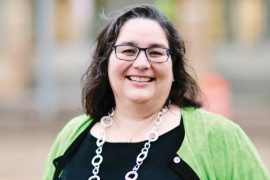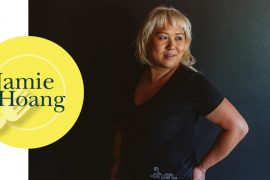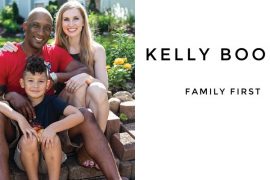By Shayna Mace | Photography By Shalicia Johnson
When you get to know Angela R. Davis, it’s easy to form a quick rapport with her. She’s whip-smart, friendly and laughs a lot. And she loves to talk about what she does as the development director at the Madison Community Foundation.
“It’s pretty cool. I have the privilege and honor to work with people on their charitable giving,” she says. “I work with so many philanthropic people in this community, and I work with our team who’s responsible for working with individuals, nonprofits and our giving partners to support charitable causes that are meaningful to them.”
Madison Community Foundation was established in 1942 as the Madison Community Trust. The organization helps individuals to support the community and the organizations they care about in a variety of ways. Supporting the community can be as simple as making a donation on the MCF website, or as complex as creating an endowment for an organization or cause they love either during their lifetime or in their estate plan. Community foundations in general are defined by a geographic area, typically no larger than a state, Davis says, so funds are generally distributed locally (some donors also give to causes around the country as well). MCF focuses on giving to nonprofits in Dane County, and also has six regional giving partners in Columbus, Lodi, Middleton, Monona, Portage and Rio that work within their communities. In 2019, MCF gave out $21 million in grants to a variety of nonprofits.
During the pandemic, Davis says MCF has fared well, because they’re a funder of nonprofits and manage a staggering $292 million in assets. In spring 2020, MCF was able to react quickly during the pandemic by handing out $103,000 worth of grants to nonprofits through A Fund for Women, a component fund of MCF. The grants specifically benefit women and girls and were awarded to Centro Hispano, Domestic Abuse Intervention Services, the Foundation for Black Women’s Wellness, the Latinx Consortium Emergency Relief Fund and others.
“That’s why I love that we can pool money through A Fund for Women, which has been around since 1993. Women and girls and families need help now. So, we were able to work with these agencies that we have relationships with. It doesn’t matter if it’s $100 or $100,000, those funds are pooled together, and when we work together as a community, that gives us the greatest impact. It’s all about impact,” she explains.
Davis got her feet wet in the development arena in Hammond, Ind., where she worked as a community development planner and director of a community center for 81⁄2 years. After returning to school to get her master’s in human resource development, she worked at Purdue University for a number of years, then came to Madison where she worked at the Wisconsin Historical Foundation before MCF.
“I had no idea you could help fund different projects or raise money [as a job]. There’s not a lot of African Americans — or people of color period — in this line of work,” so that was eye-opening for her, she explains.
Davis, who has been with MCF for 41⁄2 years, admits that hearing the dire needs of individuals and nonprofits can sometimes take its toll, but it’s something she’s embraced.
“I cry [sometimes]. I’m human, we’re all human,” she says. “If I didn’t have emotions, I wouldn’t be good at my job. I want to save everybody, and that’s something I’ve struggled with since day one. But then I say, ‘You know what? We are doing the best we can.’ That’s what I think I was born to do, is make a difference and make this world a better place than it was when I found it.”
YOU CAN DO IT, TOO
Davis gives tips on how to make your money work when giving to charitable causes.
- Listen to your heart to help you decide where to donate. “I always tell people, close your eyes and think about what it is you want to do. What drives you? Everybody has a passion for something — what’s your passion to give back?”
- Any amount of money can make a difference. “Don’t think any assistance is too small. People think you have to be a millionaire to make a charitable gift. Twenty-five dollars can make a difference to an organization — that can buy some books or hand sanitizer.”
- Think beyond dollars. “If you don’t have money, can you make other connections? Or is there other volunteer work you can do for an organization, like tutor, or teach a class or be a guest speaker via Zoom to inspire people?




